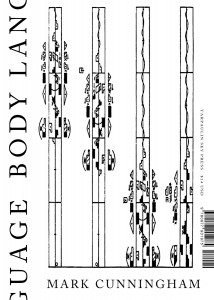 At the Adirondack Review, Steven Karl reviews Mark Cunningham’s Body Language:
At the Adirondack Review, Steven Karl reviews Mark Cunningham’s Body Language:
First impression: The reader needs some help, some outside “assistance” if you will. Booze? Maybe. Weed would be better. Open the senses just enough to block out the doubt. Focus the daydreaming.
Second impression–six minutes later and substance free: Just keep reading. It’s damn good.
It may not be what author Mark Cunningham intended, but Body Language’s greatest pleasure is as an adventure, an excellent adventure layered in sophistication exceeding anything Bill & Ted dialed up in 1989. Body Language weaves through a brain-scrambling obstacle course not unlike what one perceives pin wheeling through Hunter S. Thompson’s imagination — though Cunningham’s use of language shows respect for humans, and the human body, by leaps and bounds more than Gonzo ultimately did. Yet Body Language remains accessible without being easy, like Jeopardy. We watch — or in this case read — to see how smart we are. Cunningham tests what allusions, anecdotes, punch lines you know, be they liturgical, canonical, numerical, numerological, historical, mystical, magical, simple, or other. Turning the page to the next 10 to 12 line vignette brings anticipation that this is the chapter you’ll get, this time the inside secret is all mine. This time I’m as smart as Mark Cunningham.
At its core, Body Language is about us. Each of us. At least once. Twice. Most of the time. For some, it may be every page. It’s funny, sad and serious. Ultimately, reflective.
See also: Body Language, and all posts tagged Mark Cunningham